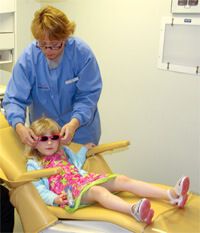4 Commonly Asked Questions to Pediatric Dentist
When it comes to our children, there can never be enough preparedness or information. We want to make sure our children are starting off on the right path and we can provide knowledgeable answers to their questions. In order to do this, it’s best to equip ourselves with reliable information. Below we have included a list of common questions about children’s dental health and some good, simple answers for parents and children alike:
When is a good time for a first appointment?
The ADA and AAPD recommend your child see a dentist by their first birthday or within six months after their first tooth appears, whichever is first. Caring for your child’s primary teeth is important for so many reasons. Primary teeth aid in speech development, help foster good nutrition by proper chewing and most importantly save space for adult teeth. Appointments at an early age can help the dentist determine your child’s risk of decay and could help prevent more complex or painful situations.
Why should you go to a kid-friendly dentist?
Pediatric dentists have extra training to help address the emotional, physical, and behavioral needs of all children. By using child-friendly language, our doctors are able to alleviate the anxiety that children may experience prior to their appointment and deliver the best oral care. Our pediatric patients leave with a healthy smile and positive attitude towards future dental care. Including a pediatric dental professional to your child’s wellness regimen will prepare them for a lifetime of excellent oral health.
When should my child start flossing?
You’ll want to make sure that by the age of four years old you are flossing your children’s teeth. This will help rid the teeth of any lodged food that might have become stuck during a meal. However, by the time your child has reached the age of eight years old they should begin to take on this responsibility themselves. It is important, however, to monitor their flossing habits to make sure that they are properly flossing their teeth to prevent gum damage.
What dietary effects might I consider?
What we eat substantially affects our health, development, and life in general. Your oral hygiene is no different. Make sure your child is making healthy choices when snacking. Foods with lots of sugar and/or starch will lead to decay and other dental issues which can adversely affect their overall health. If they do consume these types of snacks, encourage them to properly brush their teeth afterward. Check with your child’s dentist to make sure they are receiving the proper amount of fluoride, which will help reinforce enamel and maintain the integrity of their teeth at a vulnerable age.
Overall, sticking to a regular brushing and flossing schedule will do wonders for your child’s current and future dental health. Any specific questions should be addressed with your pediatric dentist. Don’t wait for any issues to arise – schedule an appointment with your pediatric dentist at Lindner Dental Associates!







